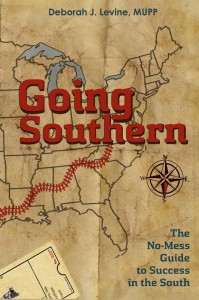
Deborah Levine has written an easy-to-read book, Going Southern, that will help the newcomers to the South and hosts avoid faux pas. It is intended for several audiences. First it is for “New Southerners, those expatriates coming to the South from other parts of the world whom she calls “internationals” and those transferring to the South from other parts of the USA. Secondly it is for Southern professionals themselves, now coexisting and working with the newcomers; thirdly, for those who may be returning to the South after being absent for a substantial time. I might add a fourth audience, namely those consultants and trainers like myself, whose vocation often includes assisting newcomers and help them settle in to a new environment and culture.
Most books about cultures tend to present objective data about a region, then go on to describe the population in cultural dimensions, and then list the do’s and don’ts, Other than dealing with the South as high context culture toward the end of the book, Levine inclines to another approach. She bases her insights on the history and attitudes of the South, particularly on the value of storytelling, showing how heritage enters everyday life. So the book becomes a concatenation of tales, both directly about the author’s experience, as well as about what others have learned by the first-hand experience of living and hearing tales told in the South. Out of this, then, come salutary “tips,” summary lists of behaviors both to do and to avoid.
Levine is an outsider–insider to the South, and draws upon both her years of experience of living in the Chattanooga and the perspective given by earlier years in Bermuda, the Northeast, and the Midwest. As an anthropologically oriented interculturalist, she knows what to look for in deciding what differences make a difference. Her credentials in these regards appear in story form at the outset of the book and she closes the pages further emphasizing the importance of the story and of storytelling in the life and literature of the South.
The first question to ask is, “Just what is the South?” Levine starts exploring this question by discussing the Mason-Dixon Line, which gave “Dixie” its name. As Woodard’s book, American Nations makes clear, there were several strains of colonization in what we call the South. It includes not only the plantation South, many of whose settlers spilled over from the Caribbean, but also the aristocratic land grant, mid-Atlantic South, as well as the Scots-Irish Appalachian settlers. Not surprisingly, people in the South will distinguish themselves from each other to avoid the wrong stereotypes being placed upon them. Stereotypes, mostly negative, of the South are prevalent both in other parts of the USA and abroad.
Levine’s treatment is essentially positive and appreciative of the diversity of the land, its history, and its peoples. It includes frankness about her experiences as an activist for interracial and social change as well as perspectives on the history of the movements for freedom. It should offset common but often inaccurate impressions of the South that newcomers are likely to carry in their mental and emotional baggage.
Levine does not hesitate to label the myths about the South as myths and then explode them with solid facts, “realities”. These distinctions are particularly important since practical awareness of Southern history as Southerners see it, local mentalities, social mores and behaviors are what is needed by a newcomer who will start to lead his or her life with new people, in a new place.
The book is also fully aware of the trauma and the challenge of change as well as the opportunities that come with globalization, immigration, and other contemporary shifts in a world where traditional rural and small-town values have long been dominant. Further, an understanding of religion and its everyday role in the lives of many, many Southerners is essential, and Levine, unlike many interculturalists, is not afraid to tackle the subject and treat it with both the seriousness and empathy that it requires.
- Going Southern Book Review from Paris – by Dr. George Simons - June 10, 2023
- SiberiaCyberHaiku – Poem by George Simons - May 8, 2019
